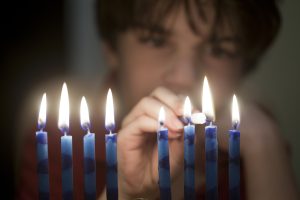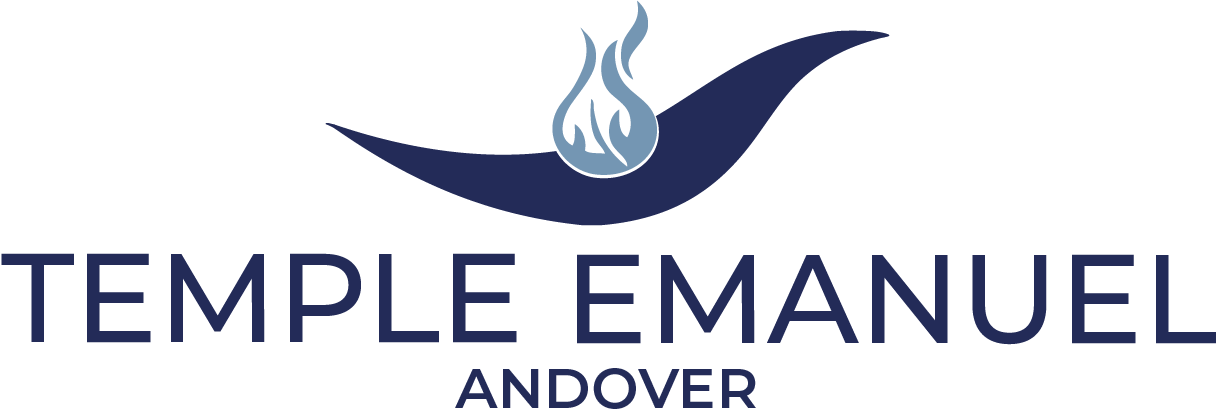The Jewish calendar is the cycle by which we live our lives. It takes us on a journey of renewal, guides us through life’s peaks and valleys, connects us to the natural world and imbues our days with meaning and purpose. Each holiday has a variety of unique traditions, foods, rituals and music to help ground us in the season. At Temple Emanuel, we see our holidays as opportunities to gather as a community to pray, learn, laugh, eat and sing.
High Holy Days
 The High Holy Days of Rosh Hashanah and Yom Kippur are a time for reflection, introspection, prayer and re-connection. Rosh Hashanah, which translates to “head of the year,” marks the start of the Jewish New Year. It’s a time marked with celebration and reflection. Yom Kippur, or “day of atonement” in Hebrew, is a holiday that culminates ten days after Rosh Hashanah with rituals of fasting, repenting and asking for forgiveness.
The High Holy Days of Rosh Hashanah and Yom Kippur are a time for reflection, introspection, prayer and re-connection. Rosh Hashanah, which translates to “head of the year,” marks the start of the Jewish New Year. It’s a time marked with celebration and reflection. Yom Kippur, or “day of atonement” in Hebrew, is a holiday that culminates ten days after Rosh Hashanah with rituals of fasting, repenting and asking for forgiveness.
Come and join our congregational family for a spiritually deep High Holy Day experience. We offer a variety of services to meet the spiritual needs of our diverse community. Review the schedule of services for a list of dates, times and locations of services and special High Holy Day programming.
Sukkot
The High Holy Day season continues after Rosh Hashanah and Yom Kippur with the festival of Sukkot, one of our three agricultural pilgrimage holidays. Sukkot, a Hebrew word meaning “booths” celebrates both the period of time during which the ancient Israelites lived in temporary huts as they traveled from Egypt to Israel, as well as the end of the harvest season. Each year, members of the Temple Emanuel community come together in our own sukkah where we hold services, classes and other programs.
Simchat Torah
The cycle of the High Holy Days concludes with Simchat Torah, as we celebrate completing the annual reading of the Torah. We demonstrate our commitment to Torah by immediately starting again from the beginning, reminding ourselves that Torah is a lifelong gift that nourishes and sustains us. We celebrate Simchat Torah with joy and laughter as we dance and sing with the Torah scrolls.
 Chanukah
Chanukah
Chanukah, our festival of lights, is a beautiful celebration of triumphing over darkness. For eight nights, we light the menorah to commemorate the miracle that occurred when the Holy Temple was desecrated and later rededicated in Jerusalem. Together with our loves ones and Temple Emanuel community, we celebrate strength, resilience, hope and healing. Though the holiday is traditionally celebrated at home, there are also many celebrations at Temple Emanuel; please join us. Explore these Chanukah resources to enhance your observance.
Purim
Purim is a joyous and playful one-day holiday on which we commemorate the story told in the Book of Esther in which Queen Esther and her cousin Mordechai saved the Jews of Persia from an antisemitic plot devised by the evil Haman, advisor to King Ahashverosh. This book, also called the Megillah (scroll), is unique among other sacred texts in that it is considered a parody or a satire, and does not mention God. At Temple Emanuel, Purim provides those of all ages with opportunity for celebration and fun. Happenings include a Kriat Megillah, or rowdy and silly reading of the Megillah where congregants “blot out” Haman’s name with groggers (noisemakers) and “booing,” a Purim shpiel—a humorous play outlining the events in the Book of Esther, dressing up in costumes and a carnival for children.
 Passover
Passover
Passover is the ultimate liberation celebration that commemorates God’s redemption of the Israelites from slavery in Egypt. We gather together at the Passover Seder to tell the Exodus story that has inspired oppressed people across the world for countless generations and remember that none of us are free until we are all free. At Temple Emanuel, we come together as a community to mark the Seder together, infusing ancient symbols and traditions with contemporary ones as we reflect on the meaning of liberation in our world today. Explore these Passover resources to help you celebrate the holiday at home.
Shavout
After Passover, which commemorates the liberation of the Israelites from bondage in Egypt, we count the seven weeks that lead to our next festival: Shavuot. Literally meaning“weeks,” Shavuot celebrates the experience of receiving the Torah at Mount Sinai, marking the pinnacle of the journey from liberation to revelation. Historically, the holiday was an agricultural pilgrimage festival celebrating the beginning of the summer harvest. Today, we celebrate the gift of Torah and the immense blessing it brings to our lives.
